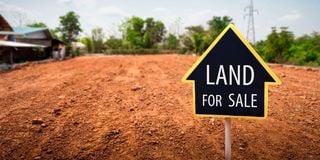Is buying land a good investment option?

land is among the very assets whose value is always on an upward trajectory
What you need to know:
- Before land is sold or bought, there are time consuming steps.
- Land is among the very assets whose value is always on an upward trajectory.
When you have some extra coins, which is your best investment option? Buying land. As they say in Kikuyu, Mburoti Maguta Maguta (a phrase directly translated as "oily plot").
Well, on the face of it, this appears to be a rational and most obvious thing to do. First, many argue, land is among the very assets whose value is always on an upward trajectory — except in very few extraordinary instances where the title is impeached, for instance, on grounds of fraud.
Second, land is as an illiquid asset. Before land is sold or bought, there are time consuming steps. This creates lack of depth of Market or ready buyers. Most Kenyans prefer this state of affairs. It disciplines their expenditure habits. Unlike cash, which is tempting, land creates a good avenue for long-term investment for idle cash that can only be liquidated in times of great crisis (like sickness) or bequeathed to children.
At the micro and individual level, land as an investment option looks good. However, at a societal and macro level, Kenyans’ obsession with land has some not-so-good social outcomes.
First, investment in land creates little or no employment. Think of the idle land which you own in some place that you have never visited. That loss-making business that you own is far much better socially as compared to that idle plot you own somewhere.
The loss-making business has some real humans working in it who have children and dependents. Imagine if everyone who had some money invested in land and stopped opening businesses. Literally there would be no jobs. Yes, your loss-making business is draining your resources but your cashier and cleaner depends on it.
At least plant some few avocados in your idle land to imbue some productivity in your idle land. One seedling of hash avocado is Sh100.
Second, if you put your extra coin in a bank account in lieu of buying land, the positive social multiplier effect would be great.
To understand this, let us first understand the very basic logic of banking. Fractional reserve banking concept sits at the core of banking. It refers to the notion that only a fraction of bank deposits is required to be available for withdrawal.
Jobs creation
Banks therefore require only to keep a specific amount as cash on hand. The balance is usually created loans from the money customers deposit. Without your deposits, banks would have no money to lend.
And without loans, there would be no commerce. And without commerce, there are no jobs and progress.
Therefore, every cash depositer in a bank is undertaking an important social good by facilitating commerce and jobs creation through consequent loans. And the more cash deposits we make in bank accounts, the cheaper the price of loans and the more people borrow and create jobs.
Third, if you put your money in stocks exchange as opposed to buying land, you render so much social good. You are providing much needed capital to businesses particularly if it is a rights issue (existing owners being asked to inject money) or Initial Public Offering.
Otherwise, the said listed business would have sought an expensive bank loan. You are also incentivising businesses to list in stocks and hence be more open and transparent in their operations. Once listed, the stocks regulator will be in check. The company will be compelled to publish books of accounts.
Some investment in land take a sentimental angle that defies logic. Many buy land and put palatial buildings in some outposts that they only visit once per year. That is dead capital. Whereas academician De Soto when he coined the phrase "dead capital" meant informally held assets, the term has been extended to mean unproductive assets.
So, what should governments do to nudge people to invest more in productive assets that can create jobs and more commerce?
For a start, government should create conditions that attract people into depositing money in banks or in stocks. Governments have created international instruments to check money laundering and hence tightened banking cash deposits rules.
Land purchases
That is good and perfect particularly when money moves from governments into private hands. But wise governments know the logic of liquidity and must weigh these concerns against the goal to incentivise cash deposits. A hot property market incidentally tends to be a marker of a tightened cash deposits market.
Lessening regulations for listing of companies into stock markets is important. Providing tax incentives for listed companies helps to nudge people towards stock market.
Taxation regime that it is biased in favour of capital gain, cash deposits and stocks helps. And most importantly, public education intended to boost cash saving culture helps.
Our struggling factories and agriculture need these monies as cheap loans as opposed to wealth buried in sand.
But this also calls for deep re-imagining on how we view home ownership and settlement patterns since majority of land purchases are for homes.
Most Kenyans dream of a home in a fenced off plot. That creates huge dilemma for governments which must provide utilities like sewerage, water, roads and electricity to far flung settlements.
Aggregated settlements that are near or inside urban centres would help collapse these costs.
Dr Irungu Kangata is the Governor of Murang’a County; [email protected]





